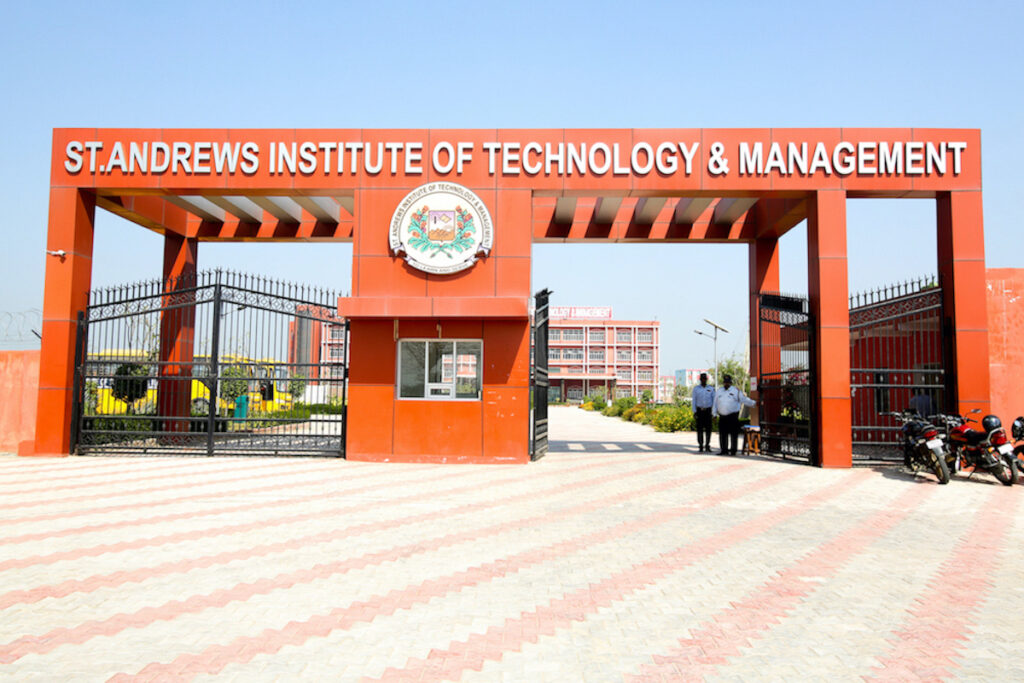What is BBA Course and full form of BBA course?

Image – 1 Best Institute Award
The BBA course refers to the Bachelor of Business Administration program, an undergraduate academic program typically offered by universities or business schools.
It is crafted to offer students a comprehensive understanding of various facets within the realm of business management and administration.
The full form of BBA is “Bachelor of Business Administration.”
Some of the most opted courses in India and St. Andrews college or different Engineering college or Management colleges are as follows:-
- Btech
- Btech CSE
- Btech ETCE
- MTech
- BCA
- BBA
- MBA
- MCA
- DPharma – St. Andrews College of Pharmacy
- BPharma – St. Andrews College of Pharmacy
- BArch – St. Andrews College of Architecture
What are the BBA Course Details?

Image – 2 Best Engineering College Award
The Bachelor of Business Administration (BBA) is an undergraduate degree program aimed at furnishing students with a comprehensive grasp of diverse aspects within the domain of business management and administration.
Here are the typical course details of a BBA program:
Duration:
The duration of a Bachelor of Business Administration (BBA) course is typically three years for full-time programs.
Some universities or colleges may offer BBA courses with a duration of four years, including internships or additional coursework.
However, the standard duration for most BBA degrees in India is three years, consisting of six semesters.
Curriculum:
The curriculum of a BBA course consists of a combination of core courses, elective courses, and practical experiences such as internships or projects. Common courses include:
- Principles of Management
- Accounting
- Finance
- Marketing
- Economics
- Business Law
- Organizational Behavior
- Human Resource Management
- Operations Management
- Strategic Management
- Business Communication
- Information Technology in Business
- Elective courses in areas such as entrepreneurship, international business, supply chain management, etc.
Specializations
Some BBA courses offer specializations or concentrations that allow students to focus on specific areas of interest within business administration, such as finance, marketing, human resource management, international business, entrepreneurship, etc.
Practical Experience
Many BBA courses include opportunities for practical experience through internships, cooperative education experiences, industry projects, or simulations.
These experiences afford students practical learning opportunities and real-world exposure to business settings.
Assessment
Evaluation methods in BBA programs commonly encompass quizzes, assignments, projects, examinations, presentations, and engagement in class discussions.
Some programs may also include a capstone project or thesis in which students apply their knowledge and skills to solve real-world business problems.
Faculty Support
BBA students receive support from qualified faculty members who provide guidance, instruction, and mentorship throughout the program.
Faculty members may have expertise in various areas of business and bring practical experience to the classroom.
Extracurricular Activities
BBA programs often offer opportunities for students to participate in extracurricular activities such as student clubs, organizations, competitions, and networking events.
These activities enhance students’ personal and professional development and provide opportunities for leadership and teamwork.
Career Development
Many BBA degrees provide career development services such as resume writing workshops, interview preparation sessions, job fairs, and employer networking events to help students transition into the workforce upon graduation.
Admissions in Bachelor of Business Administration Programs

Image – 3 Faculty Achievement
The process of BBA admissions to a Bachelor of Business Administration program generally includes multiple stages, with specific requirements that can differ from one institution to another.
Here’s a general overview of the process:
Research Programs
Start by researching different universities or colleges that offer BBA programs. Look into their curriculum, faculty, campus facilities, and reputation. Choose the ones that align with your academic and career goals.
Check Eligibility Criteria
Review the admission requirements of each institution carefully. Common eligibility criteria include completing high school education or equivalent with certain grades or GPA.
Prepare Application Materials
Collect all required documents for the application procedure, such as academic transcripts, standardized test scores (if necessary), letters of recommendation, a personal statement or essay, and any additional documents specified by the institution.
Fill out Application Forms
Complete the application forms provided by the institutions you are applying to. Most universities offer online application portals where you can submit your application electronically. Ensure that you provide accurate and up-to-date information.
Submit Application Fee
Many institutions require applicants to pay an application fee when submitting their application. Make sure to check the fee amount and payment methods accepted by each institution.
Take Admission Tests (if required)
Some universities may require you to take standardized tests such as the SAT or ACT.
Attend Interviews (if required)
Some institutions may conduct interviews as part of the admission process.
Track Application Status
Monitor your application status via the university’s online portal or communication channels. Reach out to the admissions office for any inquiries or issues.
Receive Admission Decision
After the admissions committee evaluates your application, you will be informed of their decision. Should you be accepted, an admission letter will be sent to you, detailing the subsequent steps to take, such as enrollment processes and important deadlines.
Accept Admission Offer
If you receive admission offers from multiple institutions, carefully consider your options before accepting an offer. Once you’ve made your decision, accept the admission offer by the specified deadline to secure your place in the program.
Attend Orientation
After accepting the admission offer, attend orientation sessions organized by the institution to familiarize yourself with campus life, academic requirements, and support services available to students.

Image – 4 Orientation Program for New Students
Some of the most opted courses in India and St. Andrews college or different Engineering college or Management colleges are as follow:-
What are the BBA Course Eligibility Criteria?

Image – 5 Inside View of SAITM New Block
The eligibility requirements for a Bachelor of Business Administration (BBA) course might differ based on the institution providing the program.However, there are some common requirements that are typically expected from applicants.
Here are the general eligibility criteria for BBA courses:
Educational Qualification
Applicants should have fulfilled the requirements of higher secondary education (10+2) or its equivalent from a recognized board or institution.
Minimum Percentage/Grade
Some institutions may have a minimum percentage or grade requirement for admission to the BBA course.
Specific Subjects
Some institutions may require applicants to have studied specific subjects at the higher secondary level, such as mathematics, commerce, economics, or business studies.
Entrance Exams
Many universities and colleges administer entrance exams for admission to their BBA programs. Standard entrance tests for BBA programs include the Delhi University Joint Admission Test (DU JAT), Integrated Program in Management Aptitude Test (IPMAT), Symbiosis Entrance Test (SET), among others.
Letters of Recommendation
Certain institutions might mandate that applicants provide letters of recommendation from teachers, counselors, or other individuals capable of endorsing their academic prowess, character, and suitability for the BBA program.
Interviews
In some cases, institutions may conduct interviews as part of the admission process. These interviews may be used to assess applicants’ communication skills, motivation, and alignment with the program’s goals.
Bachelor of Business Administration Course Fees

Image – 6 Convocation Ceremony for Graduates
The fees for Bachelor of Business Administration (BBA) courses can vary significantly depending on various factors such as the type of institution (public or private), location, reputation, facilities provided, and more.
Here’s a general overview of the range of BBA course fees in India:
Average Fee Range
The average BBA course fees in India can range from INR 50,000 to INR 3 Lakh per annum. This wide range reflects differences in the infrastructure, facilities, and educational quality provided by different institutions.
Government College Examples
For instance, Ramjas College under Delhi University charges about INR 30,000 per annum, which is on the lower end of the spectrum, indicative of government college fees.
Additional Costs
In addition to tuition fees, students should budget for other expenses such as hostel fees (if applicable), textbooks, study materials, transportation, food, and personal expenses.
These additional costs can vary depending on the student’s lifestyle and location.
Scholarships and Financial Aid
Many universities in India offer scholarships, grants, or financial aid to eligible students based on merit, need, or other criteria.
Prospective BBA candidates should investigate scholarship options, reviewing the eligibility requirements and application deadlines.
Fee Structure
BBA course fees in India are typically structured on a per-semester or per-year basis.
Some universities may offer payment plans or installment options to help students manage their expenses.
Entrance Exam Fees
Some universities or colleges may require students to appear for entrance exams such as the IPMAT (Integrated Program in Management Aptitude Test), SET (Symbiosis Entrance Test), or other university-specific entrance exams.
These exams may have separate application fees or examination fees.
Full-time Bachelor of Business Administration

Image – 7 Placement Drive at SAITM
Full-time BBA (Bachelor of Business Administration) refers to a traditional undergraduate program where students enroll in a comprehensive curriculum of business courses on a full-time basis.
In a full-time BBA program:
Duration
Typically, a full-time BBA course lasts for three to four years, depending on the institution and the country’s education system.
The program is structured to provide students with a solid foundation in various aspects of business management and administration.
Course Load
Full-time BBA students usually take a prescribed course load each semester, attending classes, seminars, and workshops on campus throughout the week.
The curriculum covers subjects such as accounting, finance, marketing, management, economics, business law, and more.
Internships and Projects
Many full-time BBA degrees include opportunities for internships, cooperative education experiences, or industry projects to provide students with hands-on learning and real-world experience in the business field.
Extracurricular Activities
Beyond their academic studies, full-time BBA enrollees often engage in extracurricular pursuits, including joining student clubs, organizations, contests, and networking gatherings, to further their personal and professional growth.
Faculty Interaction
Full-time BBA students have regular interactions with faculty members, including professors, instructors, and academic advisors, who provide guidance, support, and mentorship throughout their academic journey.
Career Development
Full-time BBA degrees often offer career development services such as resume writing workshops, interview preparation sessions, job fairs, and employer networking events to help students transition into the workforce upon graduation.
Graduation Requirements
To successfully complete a full-time BBA program, students must fulfill all academic requirements, including completing the prescribed coursework, meeting minimum grade requirements, and fulfilling any internship or project requirements.
Which are the Top BBA Entrance Exams?

Image -8 Manoj Tiwari Presents Awards to SAITM Students
Several top BBA (Bachelor of Business Administration) entrance exams are conducted by various universities and institutions in India and around the world.
These exams assess students’ aptitude, reasoning skills, and subject knowledge to determine their eligibility for admission to undergraduate business programs.
Here are some of the top BBA entrance exams:
IPMAT (Integrated Program in Management Aptitude Test)
Conducted by the Indian Institutes of Management (IIMs), IPMAT is the entrance exam for admission to the Five-Year Integrated Program in Management offered by IIM Indore and IIM Rohtak.
SET (Symbiosis Entrance Test)
The Symbiosis Entrance Test (SET), administered by Symbiosis International (Deemed University), serves as a gateway to a variety of undergraduate courses such as BBA, available across the Symbiosis Institutes.
UGAT (Under Graduate Aptitude Test)
The Under Graduate Aptitude Test (UGAT), overseen by the All India Management Association (AIMA), facilitates entry into various undergraduate courses, such as BBA, across participating institutions throughout the country.
DU JAT (Delhi University Joint Admission Test)
The Delhi University Joint Admission Test (DU JAT), conducted by the University of Delhi, provides a pathway to numerous undergraduate courses, including BBA, available in colleges affiliated with Delhi University.
NPAT (National Test for Programs After Twelfth)
The NMIMS Programs After Twelfth (NPAT), organized by Narsee Monjee Institute of Management Studies (NMIMS), offers access to a wide range of undergraduate courses, such as BBA, across its campuses.
AIMA UGAT (Under Graduate Aptitude Test)
The AIMA Under Graduate Aptitude Test (UGAT), managed by the All India Management Association (AIMA), opens the door for admission to BBA programs offered by affiliated institutes across the country.
GGSIPU CET (Guru Gobind Singh Indraprastha University Common Entrance Test)
Conducted by Guru Gobind Singh Indraprastha University, GGSIPU CET enables admission to various undergraduate programs, including BBA, offered by colleges affiliated with GGSIPU.
Christ University BBA Entrance Exam
Christ University conducts its entrance exam for admission to BBA degrees offered by the university.
BHU UET (Banaras Hindu University Undergraduate Entrance Test)
Administered by Banaras Hindu University, BHU UET facilitates admission to various undergraduate programs, including BBA, available at BHU.
Which are the important BBA Subjects?

Image – 9 Best Management Honour
BBA (Bachelor of Business Administration) programs typically cover a wide range of subjects to provide students with a comprehensive understanding of various aspects of business management and administration.
Some of the important BBA subjects commonly included in the curriculum are:
Principles of Management
This subject introduces students to the fundamental principles, theories, and functions of management.
Topics may include planning, organizing, leading, and controlling.
Accounting
Accounting subjects cover financial accounting principles, techniques, and practices used in recording, analyzing, and interpreting financial information.
This includes topics such as balance sheets, income statements, cash flow statements, and accounting principles.
Marketing
Marketing subjects focus on understanding consumer behavior, market research, product development, pricing strategies, distribution channels, promotion, and branding.
Finance
Finance subjects cover financial management principles, investment analysis, financial markets, risk management, capital budgeting, and corporate finance.
Economics
Economics subjects introduce students to microeconomic and macroeconomic principles, theories, and concepts such as supply and demand, market structures, inflation, unemployment, economic growth, and international trade.
Business Law
Subjects related to business law encompass legal principles and regulations pertinent to business operations, contracts, commercial transactions, intellectual property, employment regulations, and ethical considerations in business.
Organizational Behavior
Organizational behavior subjects focus on understanding individual and group behavior within organizations, motivation, leadership, communication, conflict resolution, and organizational culture.
Human Resource Management
Human resource management subjects cover topics such as recruitment, selection, training and development, performance management, compensation, employee relations, and HR strategy.
Operations Management
Subjects in operations management concentrate on overseeing business processes, production systems, supply chain management, quality assurance, inventory control, and operational strategy.
Strategic Management
Strategic management subjects cover strategic planning, formulation, implementation, and evaluation of business strategies to achieve organizational goals and competitive advantage.
Business Communication
Business communication subjects focus on developing effective written and oral communication skills, professional etiquette, interpersonal communication, and presentation skills.
Information Technology in Business
Information technology subjects cover the use of technology in business operations, including topics such as digital transformation, e-commerce, data analytics, information systems, and cybersecurity.
These are some of the essential BBA subjects typically integrated into the curriculum. The specific subjects and course offerings may vary based on the institution and the chosen specialization within the BBA program, emphasizing the development of management skills.
Online Bachelor of Business Administration Course

Image – 10 St. Andrews Institute of Technology and Management
Online BBA degrees offer students the flexibility to pursue a Bachelor of Business Administration degree through distance learning, typically via the internet.
These programs cater to individuals who may not be able to attend traditional on-campus classes due to various reasons such as work commitments, geographic location, or personal responsibilities.
Here are some key aspects of online BBA programs:
Flexibility
Online BBA programs provide flexibility in terms of scheduling and location.
Students can access course materials, lectures, and assignments from anywhere with an internet connection, allowing them to study at their own pace and balance their studies with other commitments.
Accessibility
Online BBA programs make higher education more accessible to a wider range of students, including working professionals, adult learners, and individuals residing in remote areas.
These programs remove barriers to education by offering flexible learning options and eliminating the need to commute to campus.
Course Delivery
Online BBA degrees typically utilize various digital tools and technologies to deliver course content, such as learning management systems (LMS), video lectures, online discussions, interactive simulations, and multimedia resources.
These platforms facilitate engagement, collaboration, and interaction among students and instructors.
Admission Requirements
Admission requirements for online BBA programs may vary depending on the institution.
However, they typically include educational qualifications equivalent to a high school diploma or its equivalent, standardized test scores (if applicable), and English language proficiency for non-native speakers.
Curriculum
The curriculum of online BBA programs is similar to traditional on-campus BBA programs, covering core business subjects such as management, accounting, marketing, finance, economics, and business law.
Some programs may also offer specializations or elective courses in areas such as entrepreneurship, international business, or information technology.
Faculty Support
Learners enrolled in online BBA programs benefit from the expertise of qualified instructors and academic advisors, who offer guidance, feedback, and support throughout the course of study.
Communication with faculty members is typically facilitated through email, discussion forums, virtual office hours, and online chat platforms.
Assessment and Evaluation
Assessment methods in online BBA programs may include quizzes, assignments, projects, exams, and participation in online discussions.
Accreditation
It’s important for students to ensure that the online BBA course they choose is accredited by recognized accrediting bodies or agencies.
What are the Different Types of BBA Courses?

Image – 11 National Conference Hosted by SAITM
Bachelor of Business Administration (BBA) programs may offer various types of courses to cater to the diverse interests and career goals of students.
Here are some common types of BBA courses:
General BBA
This is the standard BBA course that covers a broad range of business topics such as management, accounting, finance, marketing, economics, and organizational behaviour.
It provides a well-rounded education in business administration suitable for a wide range of business career paths.
Specialized BBA
Certain BBA programs provide specializations or concentrations enabling students to delve into specific areas of interest within business administration.
Common areas of focus include finance, marketing, human resource management, international business, entrepreneurship, supply chain management, and information technology management.
Integrated BBA-MBA
Some universities offer integrated BBA-MBA programs that allow students to earn both a bachelor’s and master’s degree in business administration in a shortened time frame.
Dual Degree BBA Courses
Dual degree BBA courses allow students to earn two bachelor’s degrees simultaneously, often in partnership with another discipline such as computer science, engineering, economics, or liberal arts.
Industry-Specific BBA Courses
Some BBA courses are tailored to specific industries or sectors, such as healthcare management, hospitality management, sports management, media management, or real estate management.
These programs offer specialized knowledge and management skills pertinent to specific industries, readying students for careers in those sectors.
Online BBA Courses
Online BBA courses offer students the flexibility to earn a bachelor’s degree in business administration through distance learning, typically via the internet.
These programs cater to individuals who may not be able to attend traditional on-campus classes due to work, family, or other commitments.
Executive BBA Courses
Executive BBA programs cater to working professionals with substantial work experience, aiming to elevate their trajectories in managerial roles and corporate leadership.
These programs typically offer flexible scheduling, evening or weekend classes, and specialized coursework tailored to the needs of experienced professionals.
BBA Programs
Accelerated BBA courses allow students to complete their bachelor’s degree in business administration in a shorter time frame than traditional programs.
These programs may offer accelerated coursework, summer sessions, or credit for prior learning to expedite graduation.
Listed below are some of the top specializations in the BBA courses

Image – 12 SAITM Achievements
Here are some of the top specializations available in Bachelor of Business Administration (BBA) courses:
Finance
Focuses on financial management, investment analysis, portfolio management, risk assessment, and corporate finance.
Marketing
Concentrates on understanding consumer behavior, market research, branding, advertising, digital marketing, and sales strategies.
Human Resource Management (HRM)
Covers topics such as recruitment, training and development, performance management, compensation and benefits, employee relations, and HR strategy.
Operations Management
Emphasizes the management of business operations, including supply chain oversight, quality control, production planning, inventory management, and process enhancement.
International Business
Deals with global business operations, cross-cultural management, international trade, foreign exchange management, and global marketing strategies.
Entrepreneurship
Concentrates on cultivating entrepreneurial abilities, business planning, startup oversight, innovation, venture capital, and the management of small enterprises.
Information Technology Management
Concentrates on the application of information technology in business, IT strategy, cybersecurity, data analytics, e-commerce, and digital transformation.
Supply Chain Management
Covers logistics, procurement, inventory management, supply chain optimization, transportation management, and supplier relationship management.
Hospitality Management
Concentrates on managing hospitality and tourism businesses such as hotels, restaurants, resorts, event management, and hospitality marketing.
Healthcare Management
Focuses on managing healthcare organizations, healthcare policy, healthcare finance, healthcare information systems, and healthcare quality management.
Real Estate Management
Deals with property development, real estate finance, property valuation, real estate investment analysis, property law, and real estate marketing.
Sports Management
Concentrates on managing sports organizations, sports marketing, event management, sports sponsorship, sports finance, and sports law.
These specializations enable learners to customize their BBA education according to their particular interests, business career aspirations, and preferred industries.
BBA Admission Requirements

Image – 13 Convocation Ceremony
The criteria for enrolling in a Bachelor of Business Administration (BBA) program can differ from one institution to another.
However, there are some common requirements that students typically need to fulfill to be eligible for admission to a BBA program.
Here are the general BBA admission requirements:
Educational Qualifications
Applicants are required to have their secondary education (10+2) or its equivalent from any recognized board or institution.
Minimum Grade or Percentage
Many BBA programs have a minimum 45% marks for admission. This requirement may vary depending on the institution for BBA admission.
Entrance Exams
Some universities or colleges require students to take entrance exams as part of the BBA admission process. Common BBA entrance exams include IPMAT, DU JAT, SET, NPAT, and others.
Application Form
Applicants need to fill out and submit the application form provided by the institution offering the BBA program.
The application form may require personal information, educational background, extracurricular activities, and other relevant details.
Application Fee
Numerous institutions mandate that applicants pay an application fee upon submitting their application. The fee amount and payment methods may differ from one institution to another.
Interview (if applicable)
In some cases, institutions may conduct interviews as part of the admission process. The interview may be used to assess applicants motivation, and alignment with the program’s goals.
Which are the Top Colleges in India for BBA Course?

Image – 14 After the Placement Drive, Celebration
Several prestigious institutions in India offer Bachelor of Business Administration degree programs known for their quality education, experienced faculty, and excellent placement opportunities.
Here are some of the top colleges in India for BBA courses:
Indian Institutes of Management (IIMs)
Some IIMs offer integrated BBA-MBA programs known as the Integrated Program in Management (IPM). IIM Indore and IIM Rohtak are among the institutes that offer this program.
St. Andrews Institute of Technology and Management(SAITM), Gurugram
St. Andrews Institute of Technology and Management provides BBA courses tailored to furnish students with essential business knowledge, practical skills, and industry insights vital for excelling in the realm of business administration.
Jamia Millia Islamia (JMI), New Delhi
JMI offers a BBA course that emphasizes research-based learning, practical training, and skill development. The university is known for its academic excellence and cultural diversity.
St. Xavier’s College, Mumbai
St. Xavier’s College offers a BMS (Bachelor of Management Studies) program known for its academic excellence, experienced faculty, and strong industry interface.
University of Mumbai, Mumbai
The University of Mumbai offers a BBA course through various affiliated colleges known for their quality education and industry connections.
What is the BBA Course Fees in Top BBA Government Colleges?

Image – 15 Certificate Distribution for Students After Completing the Workshop
The Bachelor of Business Administration (BBA) course fees in government colleges in India are relatively lower compared to private institutions due to government subsidies.
However, the exact fees vary from college to college and may be subject to change.
Government colleges often have different fee structures for students from different categories (such as general category, SC/ST, OBC, etc.).
Here are some approximate ranges of BBA course fees in government colleges:
Jamia Millia Islamia (JMI), New Delhi
The approximate course fees for the BBA degree at JMI for general category students is around INR 15,000 to INR 20,000 per year. Fees may be lower for reserved category students.
University of Delhi, Delhi
The approximate course fees for the BBA degree at colleges affiliated with the University of Delhi (DU) can vary depending on the college. Generally, fees for general category students range from INR 15,000 to INR 25,000 per year.
University of Mumbai, Mumbai
The approximate course fees for the BBA degree at government colleges affiliated with the University of Mumbai can vary. Generally, fees for general category students range from INR 10,000 to INR 20,000 per year.
University of Calcutta, Kolkata
The approximate course fees for the BBA degree at government colleges affiliated with the University of Calcutta may vary. Generally, fees for general category students range from INR 10,000 to INR 20,000 per year.
These fee ranges are approximate and based on previous years’ data. It’s essential to verify the current fees from the respective college’s official website or admission office before applying.
What is the Career Scope After BBA Course?

Image – 16 Highest Package
Earning a Bachelor of Business Administration degree unlocks diverse career pathways across numerous industries and sectors.
Here are some common career paths and job roles that BBA graduates can pursue:
Management Trainee/Executive
Many individuals who complete their BBA often begin their careers as management trainees or executives in organizations spanning sectors such as banking, finance, consulting, marketing, HR, operations, and sales.
In these roles, they receive training and gain hands-on experience in multiple aspects of business operations and management.
Business Analyst
Bachelor of Business Administration professionals with robust analytical and problem-solving skills may pursue roles as business analysts, tasked with analyzing business processes, pinpointing areas for enhancement, and proposing strategies to boost efficiency, productivity, and profitability.
Marketing/Sales Executive
Bachelor of Business Administration professionals specializing in marketing can seek positions as marketing executives or sales executives, engaging in tasks such as devising and executing marketing strategies, conducting market research, overseeing advertising campaigns, and fostering relationships with clients and customers.
Financial Analyst
Bachelor of Business Administration professionals with a focus on finance can embark on careers as financial analysts, responsible for analyzing financial data, assessing investment opportunities, compiling financial reports, and offering recommendations to aid organizations in making informed financial decisions.
Human Resource Specialist
Bachelor of Business Administration graduates specializing in human resource management can work as HR specialists, where they handle recruitment, employee relations, performance management, training and development, compensation and benefits, and HR policy implementation.
Operations Manager
BBA professionals specializing in operations management can assume positions as operations managers, tasked with supervising the production process, coordinating supply chain logistics, enhancing operational efficiency, and ensuring the seamless day-to-day operations of the organization.
Entrepreneur/Business Owner
Some BBA professionals embark on entrepreneurial ventures, entering the business world to capitalize on their understanding of business fundamentals and management principles. They launch startups, manage small enterprises, or pursue entrepreneurial endeavors across various sectors, navigating the intricacies and possibilities of the business landscape.
Consultant
BBA professionals can pursue careers as management consultants, delivering advisory services to organizations regarding diverse business challenges like strategy development, process enhancement, organizational restructuring, and performance optimization.
Project Manager
BBA professionals with strong organizational and leadership skills can explore careers as project managers, responsible for planning, executing, and supervising projects from initiation to completion. They ensure projects are delivered punctually, within budget, and meet the satisfaction of stakeholders.
Supply Chain Analyst/Logistics Manager
BBA professionals specializing in supply chain management can take on roles as supply chain analysts or logistics managers, overseeing the flow of goods, coordinating logistics operations, optimizing supply chain processes, and reducing costs.
Which are the Top Colleges for BBA Courses location-wise?
Here’s a list of some of the top colleges for Bachelor of Business Administration courses in India, categorized by location:
Delhi-NCR:
- St. Andrews Institute of Technology and Management, Gurgaon
- Delhi University
Mumbai, Maharashtra:
- Narsee Monjee Institute of Management Studies (NMIMS), Mumbai
- St. Xavier’s College, Mumbai
- University of Mumbai, Mumbai
- Jai Hind College, Mumbai
- HR College of Commerce and Economics, Mumbai
Bangalore, Karnataka:
- Christ University, Bangalore
- Symbiosis Centre for Management Studies (SCMS), Pune (Bangalore Campus)
- Jain University – CMS Business School, Bangalore
- Kristu Jayanti College, Bangalore
- Mount Carmel College, Bangalore
Pune, Maharashtra:
- Symbiosis Centre for Management Studies (SCMS), Pune
- Brihan Maharashtra College of Commerce (BMCC), Pune
- Ness Wadia College of Commerce, Pune
- Modern College of Arts, Science, and Commerce, Pune
- Sinhgad College of Commerce, Pune
Chennai, Tamil Nadu:
- Loyola College, Chennai
- Madras Christian College (MCC), Chennai
- Women’s Christian College (WCC), Chennai
- Guru Nanak College, Chennai
Hyderabad, Telangana:
- Osmania University – Department of Business Management, Hyderabad
- St. Francis College for Women, Hyderabad
- ICFAI Business School (IBS), Hyderabad
- Nizam College, Hyderabad
- Villa Marie College for Women, Hyderabad
Kolkata, West Bengal:
- St. Xavier’s College, Kolkata
- Goenka College of Commerce and Business Administration, Kolkata
- Bhawanipur Education Society College, Kolkata
- Institute of Engineering and Management (IEM), Kolkata
- Presidency University, Kolkata
Is there any option to pursue BBA Online Courses in India?

Image – 17 Digital Marketing Training for BBA Students
Yes, there are options to pursue Bachelor of Business Administration online courses in India.
With the advancement of technology and the increasing demand for flexible learning options, several universities and institutions offer online BBA courses that allow students to study from anywhere at their convenience.
Here are some options for pursuing online BBA courses in India:
Indira Gandhi National Open University (IGNOU)
IGNOU offers a Bachelor of Commerce with Major in Financial and Cost Accounting (B.Com F&CA) program through distance learning mode, which covers similar subjects to those in a BBA program.
It provides flexibility for students to study at their own pace through online materials and support services.
Karnataka State Open University (KSOU)
KSOU offers an online BBA degree that covers multiple aspects of business administration, including management principles, marketing, finance, HR, and operations.
The program is designed to cater to the needs of working professionals and students seeking flexibility in their studies.
ICFAI University, Tripura
ICFAI University presents a digital BBA program that equips learners with a solid grounding in managerial principles, leadership skills, and applied expertise.
The program is delivered through an interactive online platform and is designed to accommodate the schedules of working professionals.
Pondicherry University
Pondicherry University offers an online BBA course through its Directorate of Distance Education (DDE).
The program covers various subjects related to business administration and management and provides flexibility for students to study from anywhere at their own pace.
Frequently Asked Questions (FAQs):-
What is BBA course all about?
A Bachelor of Business Administration course is an undergraduate program offering students a detailed grasp of different facets of corporate governance and administration.
This program encompasses fundamental topics like accounting, finance, marketing, human resources, operations, and strategic management.
BBA courses also emphasize practical learning, soft skills development, and industry relevance, preparing students for diverse career opportunities in the business world.
What is BBA in degrees?
It is an undergraduate program dedicated to offering students a thorough insight into diverse elements of corporate governance and administration.
BBA programs commonly encompass fundamental subjects including accounting, finance, marketing, human resources, operations, and strategic management.
The degree aims to equip students for entry-level management roles in the corporate sector or for advanced studies in specialized areas, including enrollment in an MBA program or other master’s degrees.
Which BBA has highest salary?
The BBA specialization offering the highest salary potential can fluctuate based on factors like industry, location, and individual skills.
However, specializations like Finance, Marketing, and Information Technology Management often offer lucrative salary prospects.
Graduates with expertise in areas such as investment banking, digital marketing, or IT consulting tend to command higher salaries due to high demand and specialized skill sets. Continuous learning and gaining practical experience further enhance earning potential.
What is the job of BBA?
The job roles for Bachelor of Business Administration graduates vary widely across industries and sectors.
Typical job roles may include positions such as management trainee, marketing executive, financial analyst, human resource specialist, operations manager, business analyst, sales executive, consultant, and entrepreneur.
BBA graduates may work in areas such as banking, finance, consulting, marketing, human resources, operations, and entrepreneurship, depending on their specialization and career interests.
What is the purpose of a BBA degree?
A Bachelor of Business Administration (BBA) degree aims to equip students for roles in different facets of corporate governance and administration.
It equips graduates with a comprehensive understanding of business principles, practices, and processes, enabling them to pursue roles in areas such as finance, marketing, human resources, operations, consulting, entrepreneurship, and more.
BBA degrees provide a solid foundation for entry-level management positions in the corporate world or for further education in specialized fields such as MBA program or other advanced degrees.
What is BBA salary?
Earnings for Bachelor of Business Administration degree holders can greatly differ based on aspects like the sector, position, geographic area, years of experience, and personal capabilities.
Entry-level positions for BBA graduates typically offer salaries ranging from INR 3 lakh to INR 6 lakh per annum in India.
However, with experience and specialization, BBA graduates can earn significantly higher salaries, with some professionals earning upwards of INR 10 lakh per annum or more in managerial or specialized roles.
It’s essential to research industry standards and negotiate compensation based on qualifications and market demand.
What is BBA student about?
A Bachelor of Business Administration student is an individual engaged in an undergraduate program centered on corporate governance and administration.
They study subjects such as finance, marketing, human resources, operations, and strategic management.
Participants in BBA programs cultivate abilities in communication, critical thinking, problem-solving, and leadership, readying them for entry-level management roles or advanced studies in specialized business areas.
What is BBA after 12th?
BBA after 12th refers to pursuing a Bachelor of Business Administration degree immediately after completing high school.
It is a three-year undergraduate program that offers learners an in-depth insight into diverse facets of corporate governance and administration.
Pursuing a BBA after 12th grade provides learners with essential insights into business courses covering finance, marketing, human resources, operations, and strategic management, setting the stage for entry-level management roles or advanced studies in business-oriented disciplines.
What is Business World?
The business world encompasses the global commercial environment, involving the exchange of goods, services, and information.
It spans diverse sectors, driven by market competition, consumer trends, and technological innovations.
Professionals navigate complex challenges, including financial management and regulatory compliance, aiming for growth and sustainability.
This dynamic realm is shaped by economic policies and global events, requiring strategic decision-making and adaptability for success.





